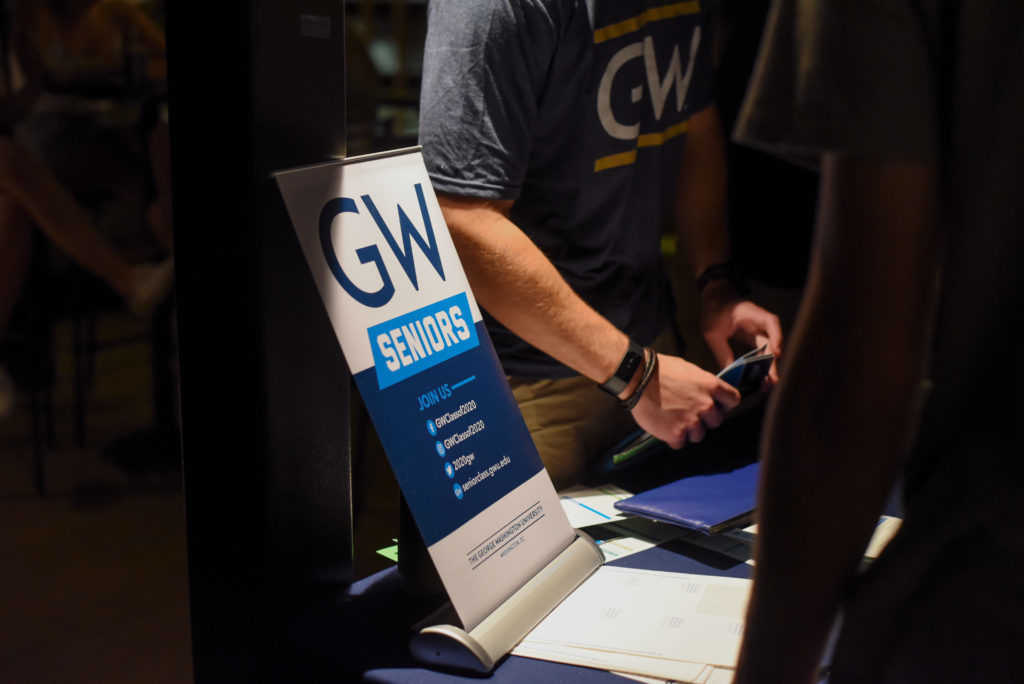This year’s senior class gift coordinators said they want to foster a stronger sense of unity in the graduating class and improve the campaign’s marketing.
Senior class gift coordinators Malcolm Badger, Helena Doms and Jared Levinson said they will host social events, like happy hours and meals, throughout the year to encourage interactions between the entire senior class and improve a sense of community among students. The events, along with social media promotion, will help raise awareness for the campaign and encourage donations from seniors, organizers said.
“One of our main goals is to improve the relationships that we have with the GW campus as a whole,” the three organizers said in a joint email.
Badger, Doms and Levinson said they want to reach 350 or more recurring gifts from seniors at or above one of three contribution levels, ranging between $4.17 and $20.84 per month. Last year’s gift organizers also placed an emphasis on recurring donations, rather than one-time gifts.
Senior class gift campaign coordinators last year raised almost $80,000 from about 39 percent of the class, about a 43 percent decrease from the $140,882 raised by the Class of 2018.
This year’s organizers hosted a “Senior Kickoff” event Sept. 4 on the rooftop of Hotel Hive, offering giveaways like drink tickets and GW “accessories.” The organizers also doled out more than 150 free bagels and t-shirts at the annual Senior Breakfast on Aug. 26. Organizers said they plan to continue hosting social gatherings, including a Halloween-themed event next month.
The three organizers said they will focus on rekindling old friendships between seniors after learning that many attendees at the kickoff event did not have close bonds with friends they made earlier in their time at GW.
“At our senior kickoff, we heard many comments that it was the first time that some seniors had seen their friends since freshman year,” the organizers said. “We want to create more opportunities like that, in addition to promoting and advertising other senior-related events, dates and deadlines.”
The organizers also administered a survey to seniors at the beginning of the academic year through a Google Form and received “great feedback” about their overall student experience, awareness of the gift campaign and event interest. Ninety-one seniors responded to the survey, which coordinators said will guide the types of events organizers hold this year.
“We used the survey to gauge what seniors would be interested in, and we received many great responses,” they said.
The organizers added that they plan to hold career preparatory events, like hosting a networking event and offering headshots for seniors, to help them land jobs after graduation. Last year’s organizers partnered with the Center for Career Services to host career panels.
“Senior year can be stressful, which is why we thought hosting an event with GW alumni and career services would assist seniors looking for their next step,” this year’s organizers said.
Badger, Doms and Levinson said they will enhance their marketing by using social media accounts and “educational materials,” which will spread awareness about the campaign and related events. The campaign’s past events have been advertised on the senior class Facebook page and Twitter account.
“We also plan to use the accounts to celebrate students who make their gifts,” the organizers said. “At the end of the day we’re seniors too, we want to connect with the class on a humorous, easy-going level.”
The organizers declined to say how much money they hope to raise or what percentage of the senior class they hope will participate.
Higher education philanthropy experts said the messaging and events surrounding a senior gift campaign can entice more students to donate.
Andrew Foiles, the assistant director of student and young alumni engagement at Virginia Tech, said events throughout the year can “absolutely” promote the gift campaign by making seniors aware of the campaign early on.
“We’re going to have a presence at the different academic colleges and will have a welcome back event this year,” Foiles said. “And we’ll be there just to talk with people – not necessarily to make the ask, but just to make sure that brand recognition and identity is getting out there.”
Foiles said setting donation goals can encourage students to donate by creating a sense of competition. The organizers said they are working with the Division of Development and Alumni Relations to offer new matching gift incentives in addition to traditional donation challenges involving fraternities and sororities.
“Students – I’m sure this is pretty equal across the board – love a good competition,” Foiles said. “They want to make sure that they beat last year, or maybe they want to outdo a rival institution.”
Rebekah Hatherly, the young alumni and student engagement coordinator at High Point University in North Carolina, said building friendly relationships between coordinators and other members of the class can make asking for gifts “easier.”
“I think the more you spend time with people and the more you get comfortable with them, the more you get to answer questions that you might not be wanting to when you first initially meet them,” Hatherly said.
Hatherly added that the focus on recurring donations could also lead to a jump in alumni giving rates in the future.
“Alumni participation is always great because you want your students to see that just because you graduate from the university, you’re still part of it,” she said. “You should always want to have the university getting better and bringing more students and providing scholarships.”
Shannon Mallard contributed reporting.





